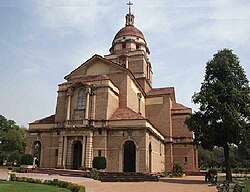| Church of North India | |
|---|---|
 Official seal of the Church of North India | |
| Classification | Protestant |
| Orientation | United church
|
| Polity | Episcopal [1] [2] |
| Moderator | The Most Rev. Dr. Paritosh Canning |
| Deputy Moderator | The Rt. Rev. Dr. Silvans S Christian |
| General Secretary | The Rev. Dr. D. J. Ajith Kumar |
| Distinct fellowships | World Council of Churches, Council for World Mission, Christian Conference of Asia, Communion of Churches in India, National Council of Churches in India |
| Associations | |
| Region | All of India except Andhra Pradesh, Telangana, Lakshadweep, Karnataka, Kerala and Tamil Nadu |
| Origin | 29 November 1970 Nagpur |
| Merger of |
|
| Separations | United Church of Northern India – Presbyterian Synod [3] |
| Congregations | 3500 congregations in 3000 parishes and 28 dioceses [4] |
| Members | 2,300,000 (2025) |
| Ministers | 2000+ [4] |
| Hospitals | 65 hospitals and nine nursing schools. |
| Secondary schools | 564+ educational institutions and three technical schools. |
| Official website | cnisynod.org |
The Church of North India (CNI) is the dominant united Protestant church in Northern India. It was established on 29 November 1970 by bringing together most of the Protestant churches working in northern India. It is a province of the worldwide Anglican Communion and a member of the World Methodist Council and the World Communion of Reformed Churches. [5] [4] The merger, which had been in discussions since 1929, came eventually between the Church of India, Pakistan, Burma and Ceylon (Anglican), the Methodist Church, Disciples of Christ, and some congregations from the United Church of Northern India (Congregationalist and Presbyterian). [5]
Contents
- History
- Beliefs and practices
- Liturgy
- Ordination
- Governance
- Social involvement
- Ecumenism
- Gallery
- Present administrators
- Moderators
- Dioceses
- Diocese of Calcutta
- Diocese of Mumbai
- Diocese of Chotanagpur
- Diocese of Lucknow
- Diocese of Nagpur
- Diocese of North East India
- Diocese of Nasik
- List of Dioceses
- See also
- References
- External links
The CNI's jurisdiction covers all states of India with the exception of the five states in the south (Andhra Pradesh, Telangana, Karnataka, Kerala and Tamil Nadu which are under the jurisdiction of the Church of South India). It has approximately 2,300,000 members (0.2% of the population of its constituent states) in 3,000 pastorates. [3] [6] [7]

















